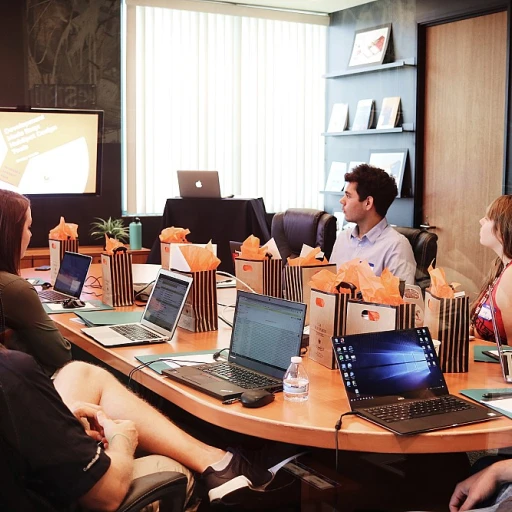-teaser.webp)
Understanding the Role of a People Manager
Grasping the Significance of People Management
In the realm of workforce planning, the role of a people manager is pivotal. These management professionals serve as the bridge between organizational goals and the individual aspirations of team members. Effective people management involves an array of skills that ensure a harmonious work environment, facilitating both employee performance and development. People managers are tasked with the daily responsibility of managing people to meet both team objectives and organizational needs. This often requires a balanced approach to communication and empathy, ensuring that team members feel supported and valued.Fostering a Positive Work Environment
A primary goal of good people management is to cultivate a positive work environment where open communication and active listening are staples. By promoting feedback mechanisms and conflict resolution strategies, managers can significantly improve employee engagement, thereby enhancing overall work performance. Additionally, people managers must address individual and team goals through effective performance management initiatives. These may include targeted training development programs tailored to enhance the skills of employees.Balancing Work and Life
Work-life balance plays an integral role in workforce planning management. People managers are tasked with crafting schedules and responsibilities that accommodate the personal lives of their team members without jeopardizing productivity. This balance not only boosts employee morale but also fosters loyalty and reduces turnover. Understanding these aspects of the people manager’s role is critical. Equipped with strong management skills in problem solving and leadership, a people manager becomes an essential asset in optimizing human resources for future success, ensuring both organizational growth and employee satisfaction. For more insights, you can explore how organizations can further refine their human resources strategies here.Key Challenges Faced by People Managers
Typical Obstacles in People Management
People managers play a crucial role in shaping the work environment and achieving organizational goals, yet they often encounter several challenges. These challenges can directly impact employee performance and the overall effectiveness of the management team.
Navigating Communication Challenges
Effective communication is essential for good people management. Managers must ensure open communication channels with their team members. This requires active listening skills and the ability to provide constructive feedback. Miscommunication can lead to confusion, low employee engagement, and decreased morale. Building effective communication strategies is an ongoing process and a key aspect of a manager's role.
Balancing Individual and Team Development
Managers need to focus on both individual and team performance management. While every employee's growth and development are important, aligning individual goals with team objectives can be challenging. Providing personalized training and development opportunities while maintaining a focus on team cohesion is essential for effective workforce planning.
Addressing Conflict Resolution
Managing people involves dealing with conflicts that may arise among team members. Conflict resolution requires patience, empathy, and excellent problem-solving skills. People managers must maintain a positive work environment by addressing issues promptly and fairly, ensuring that it does not affect the team's overall productivity and work-life balance.
Fostering Employee Engagement
Keeping employees engaged is another significant challenge for people managers. Engagement is closely tied to job satisfaction and has a direct impact on employee performance. Managers should strive to understand their team's needs and offer support, recognition, and growth opportunities. A proactive approach in this area leads to a more motivated team and better overall performance.
To learn more about strategic approaches to planning your workforce's future, visit the planning your workforce's future guide.
Strategies for Effective Workforce Planning
Implementing Strategic Workforce Tools
People managers play a pivotal role in workforce planning by devising strategies that align organizational goals with the skills of employees. One way to achieve this is through strategic development and feedback. Encouraging open communication and active listening among team members promotes a positive work environment and strengthens employee engagement and performance.Enhancing People Management Skills
Effective people management involves understanding individual needs and providing the necessary support for employee development. This process includes offering targeted training programs that enhance the competencies of team members. People managers must empower employees by tailoring opportunities to their unique skills and work preferences, ultimately fostering a balance between work and life goals.Promoting Continuous Improvement
Frequent performance evaluations and feedback sessions contribute to continuous improvement in both employee performance and team dynamics. By utilizing feedback mechanisms, managers can pinpoint areas for individual growth and implement problem-solving techniques, ensuring the overall development and progress of their team members. To learn more about crafting feedback strategies, refer to this article on effective 360-degree feedback questions.Building Resilience Through Conflict Resolution
Conflict resolution is integral to maintaining a harmonious and productive work environment. Good people management skills involve recognizing tensions and addressing them promptly. By fostering a culture of open dialogue and active listening, managers can mitigate conflicts, leading to a more cohesive team and, ultimately, more effective workforce planning.Fostering an Adaptive and Positive Work Culture
A flexible and adaptive workforce can swiftly respond to changes and challenges. People managers are tasked with cultivating an adaptive culture that values employees' contributions while continuously seeking ways to improve the work environment. This adaptability not only enhances employee satisfaction but also drives the organization towards larger strategic objectives.Leveraging Technology in Workforce Planning
Utilizing Advanced Tools for Workforce Efficiency
As the workforce landscape continues to evolve rapidly, people managers are increasingly turning to technology as a key enabler for effective workforce planning. Embracing digital tools not only supports people managers in optimizing employee performance management but also enhances decision-making processes. In this context, the integration of technology becomes instrumental in managing people and fostering a positive work environment. Firstly, technology facilitates a seamless management process by providing tools for tracking employee performance, managing team member workloads, and ensuring work life balance. Accessible data analytics and performance management systems help managers identify areas for employee development, thus playing a crucial role in aligning workforce skills with strategic business goals. Secondly, communication tools play a pivotal role in management. By leveraging platforms that foster active listening and open communication, managers can maintain strong connections with their team members, ensuring a flow of feedback and support. This not only aids in employee engagement but also promotes conflict resolution and problem-solving capabilities within teams. Additionally, technology supports training development, allowing people managers to identify training needs and offer tailored programs for skill enhancement. This individualized approach contributes to performance improvement and career progression, strengthening the team's overall capabilities. Incorporating technology in workforce planning demands a strategic approach, wherein people managers assess the specific tools that best meet their team's needs. From sophisticated HR management systems to collaborative platforms, the landscape of technological options is vast yet critical for building an effective and flexible workforce. Therefore, leveraging technology in workforce planning not only enhances the management role but actively contributes to achieving people management excellence. By adopting these technological solutions, managers can ensure their teams remain agile, adaptable, and geared for success in a dynamic work environment.Building a Flexible Workforce
Adapting to Workforce Needs
In today's dynamic work environment, building a flexible workforce is crucial for effective management. As roles and responsibilities evolve, people managers must ensure that employee skills align with organizational goals. Flexibility not only helps in meeting immediate business demands but also supports long-term development and performance objectives. Employee Engagement and Adaptability To foster a positive work environment, managers should encourage open communication and active listening among team members. By promoting a culture of feedback, employees feel valued, resulting in increased engagement and motivation. This, in turn, enhances their ability to adapt to changes, helping the organization navigate fluctuating market conditions. Developing Versatile Skills Effective people managers focus on continuous training and development for their team members. By identifying individual strengths and areas for improvement, managers can tailor training programs to enhance both current performance and future potential. Steps to consider include:- Conducting regular performance management reviews
- Offering diverse training development opportunities
- Setting achievable goals that align with both personal and professional growth














